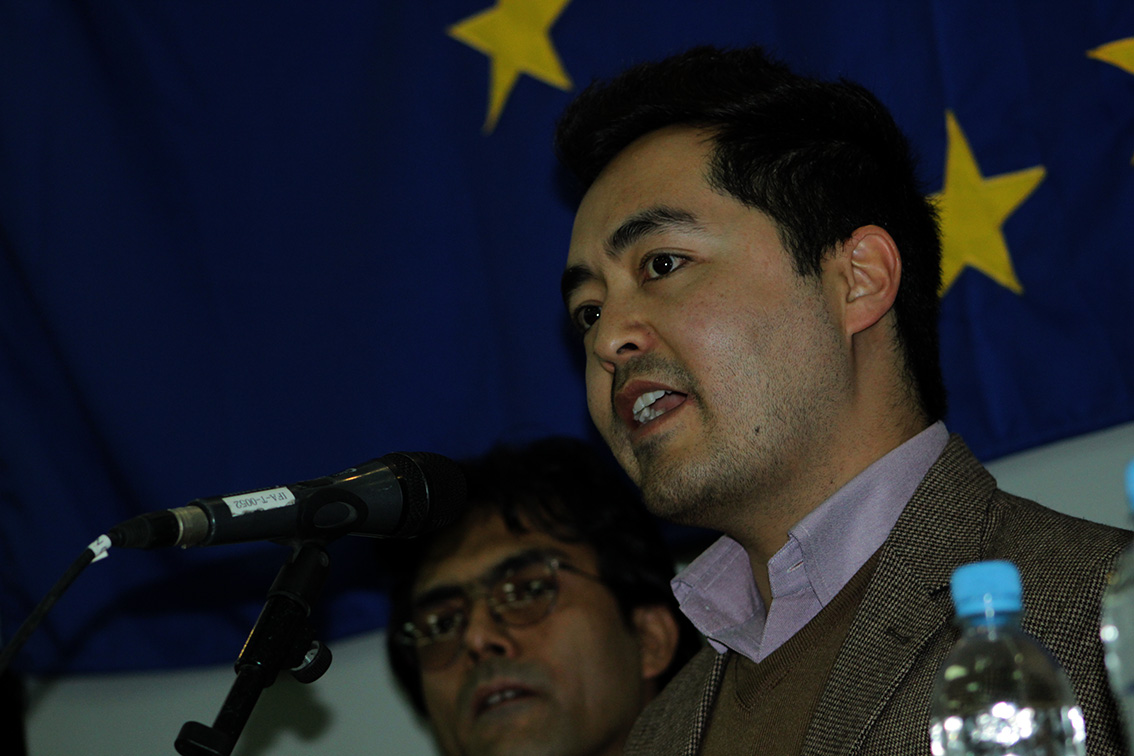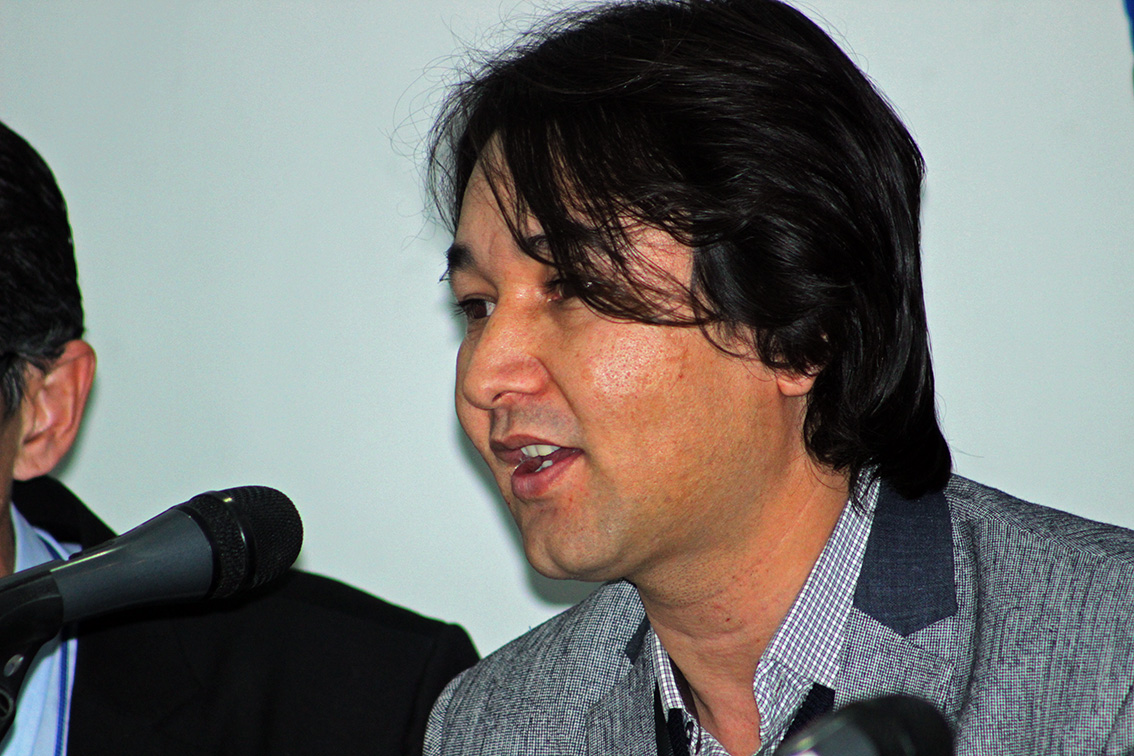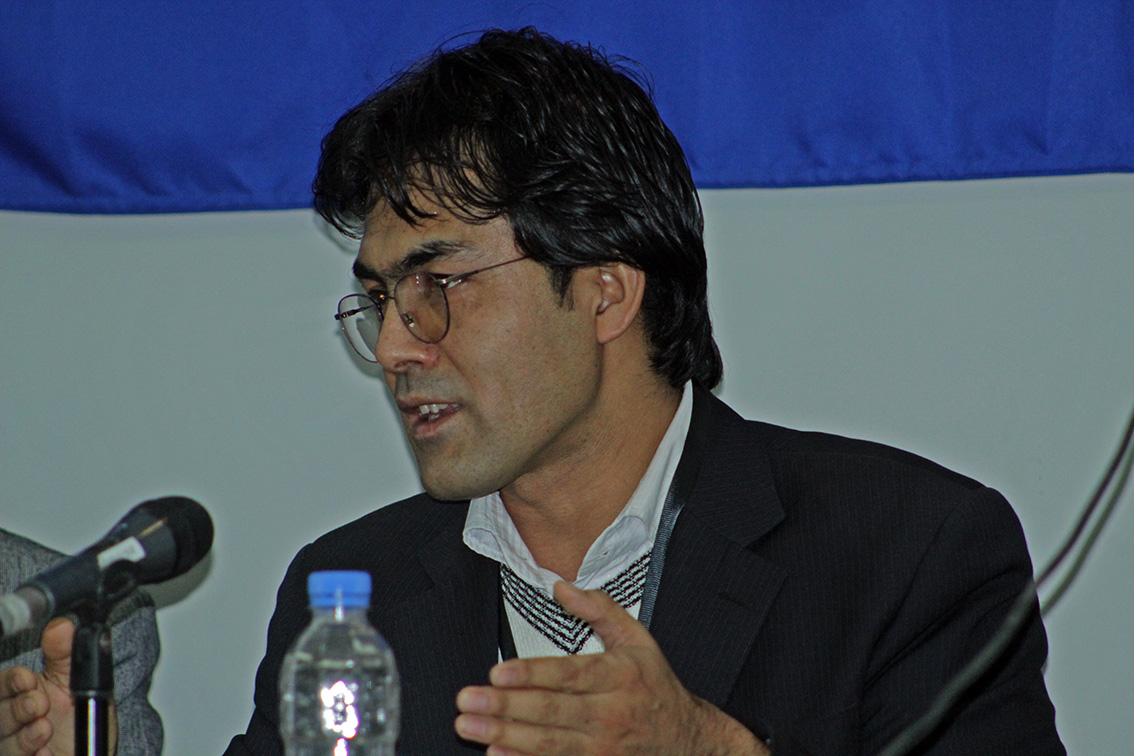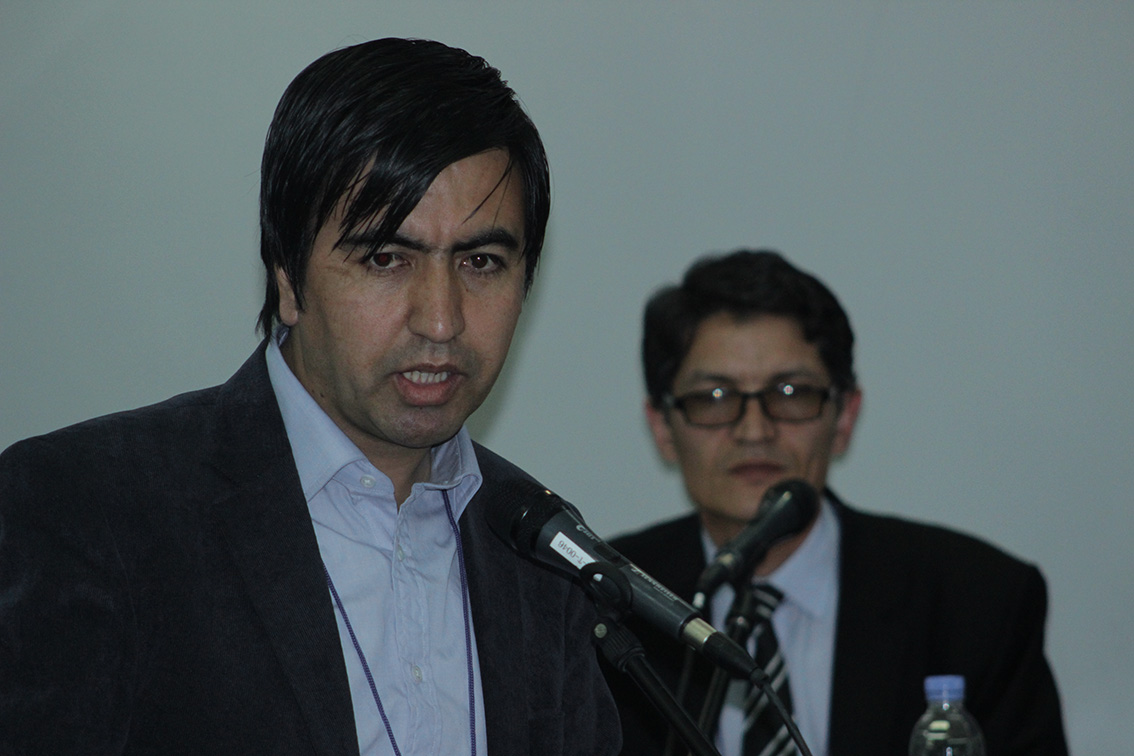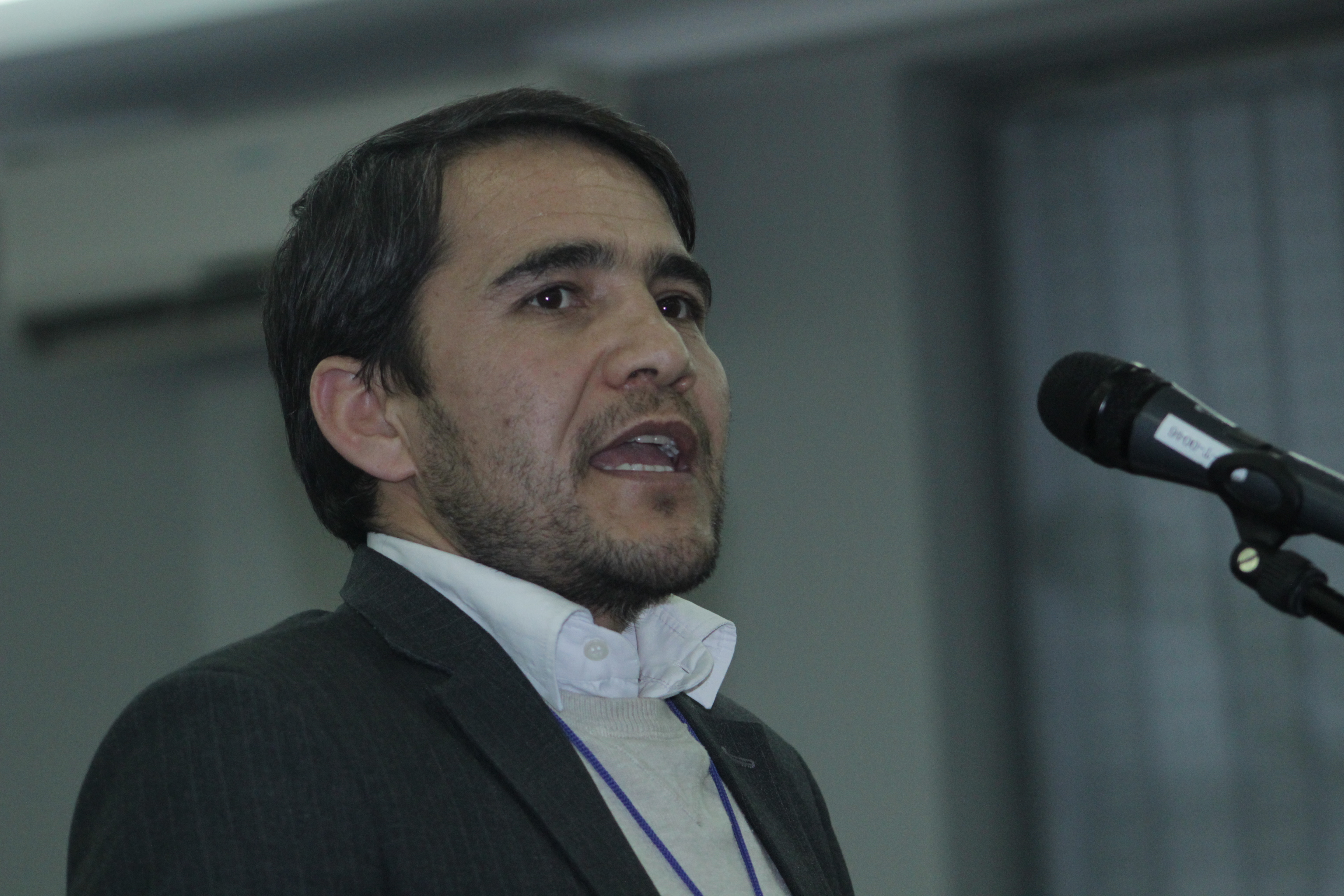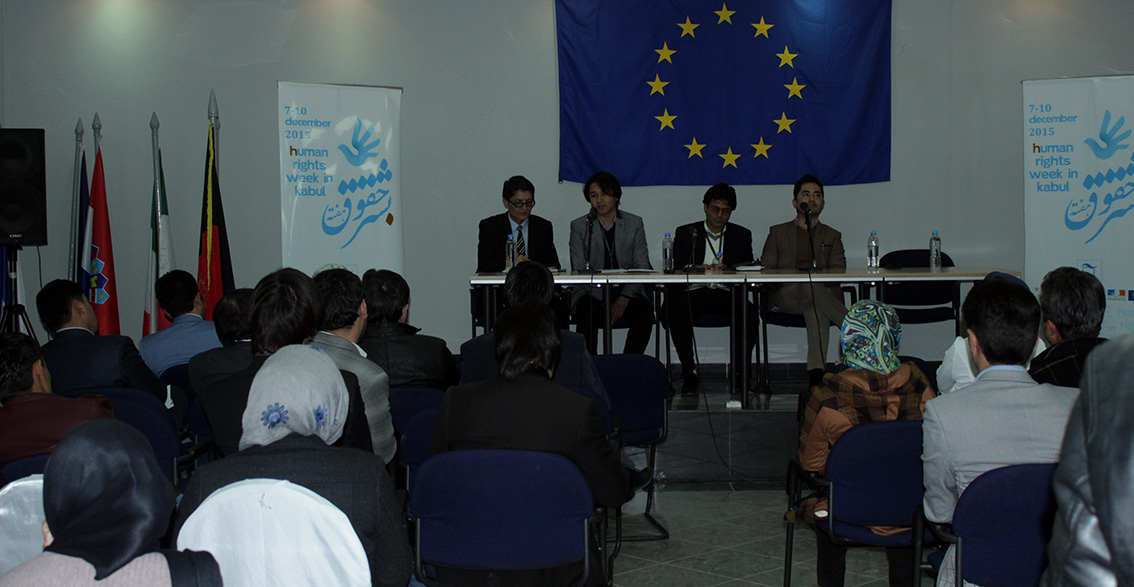
The second day of Human Rights Week started on 8 December 2015 at the EU Delegation premises. The topic of discussion was “What does transitional justice mean to people of Afghanistan? From good will to will power and action to build peace on national level.
” Transitional justice activists, students and media representatives were present. The EU, the French Embassy, the French Institute Afghanistan, UN Women in Afghanistan and the Swiss Cooperation Office Afghanistan were sponsors of this programme.
Three transitional justice researchers addressed the meeting. They were unanimous that the history of Afghanistan is marred by atrocities; peace processes have not led to peace but increased the violence, because they were not based on justice.
Abdullah Ahmadi, member of Transitional Justice Coordination Group and moderator of the meeting said: “In the past one decade and a half, we have faced many challenges despite the achievements. Even though transitional justice was a demand of the people, the achievements were not as considerable as expected. The enactment of the Law for Prohibition of Violence provided a loophole to evade justice. One of the great achievements was the accession of Afghanistan to the International Criminal Court, which paved the way to deal with post-2003 crimes. However, that is also a challenging issue.”
Ahmad Shoja, researcher of Human Rights Watch for Afghanistan, said: “Transition has taken place in Afghanistan, but justice has not been established.”
He argued that the General Amnesty and Reconciliation Law had caused “an increase in human rights violations” and that law as well as the failure to publish the “conflict mapping report” and the halt to the government’s Action Plan were obstacles that have prevented the implementation of transitional justice in Afghanistan. “There are groups that have committed crimes in the last decade and a half, but nobody has brought them to trial. Many such groups are part of the government. Under the international law, the government is obliged to have a justice system and prosecute everybody who commits crimes against humanity.”
Mr Shoja was of the opinion that justice does not contradict peace, but there would not be any flexibility concerning “war crimes” or “crimes against humanity” and perpetrators would be prosecuted. “Transitional justice is a pervasive and democratic process related to people’s demands. Do people pardon human rights violators or prosecute them?”
The third speaker Hadi Marefat, head of the Afghanistan Human Rights and Democracy Organisation, discussed the problems of transitional justice in the world and Afghanistan. “A major reason for the failure of transitional justice is related to theory. In most parts of the world, transitional justice is a government-centred process. After war, governments are usually unstable, because war undermines the national structures and various social, political and cultural crises occur. The government-centred nature of transitional justice increases the probability of instrumentalisation of the process and it is used for personal vendettas.”
Marefat cited examples from the former government saying, President Hamed Karzai’s government had used the process as “an instrument against his opponents, but later signed the Amnesty Law to appease the Taliban and the mujahedin. The Amnesty Law was a strong blow to the weak body of transitional justice.” The Amnesty Law is “the law for the death of justice.”
Marefat added: “The elite’s views do not fulfil victims’ demands. The elite view the situation, at best, from their own perspective, but they cannot reflect the experience of the victims. There is a great difference between the outlook of one who experiences pain and one who watches it.”
Criticising the activities concerning transitional justice, he emphasised: “We have only underlined the legal aspect of transitional justice, but we would have arrived at our goal faster, if we had paid attention to other aspects too. Human rights violations take shape in a historical and social context. Dealing with perpetrators only would not take us to justice. It is only possible to end the cycle of violence if we understand the systems that produce violence.”
“There is also a serious defect concerning the classification of periods of transitional justice. Crimes have always been committed. Therefore, we cannot implement transitional justice for one group or period and forget others. Why is no attention paid to Abdulrahman Khan, Nader Shah and other blood-shedding systems?”
Despite the high level of spending, there has been little achievement and transitional justice has been going down a declining path since 2007, according to Marefat. “Most groups involved in transitional justice in Afghanistan lacked a proper understanding of it. Victims do not have an understanding of it; even the administrators do not have much understanding of it.”
The international community and the Afghanistan government also bear the brunt of criticism: “More than 20 high ranking Taliban officials who were serious perpetrators of human rights violations were taken off the UN black list. Two of them, Mulla Fadzl Madzlum and Mulla Nouri, were respectively involved in organising the scorched land action in the north and the massacre of the Hazaras in Seyyedabad. A decade of international community’s approach to transitional justice has been combined with political interests rather than human rights motives.”
Hussain Hassrat, a former colleague of the Afghanistan Independent Human Rights Commission (AIHRC), paid more attention to the history of Afghanistan in his address: “Transitional justice is a procedure for dealing with atrocities. History of Afghanistan is a history of violence, crime, massacre, land grabbing, and forced displacement. Those crimes were at the focus of the national politics. On enacting the Amnesty Law, our politicians did not think the people to be worth anything. They thought the conflicting parties would forgive one another and the issue would be done with. That is the worst possible approach.”
Referring to the massacre of Armenians by the Turkish government in 1905, he said: “A few years before that, Abdulrahman Khan had committed by far worse crimes against the Ghilji, the Shinwari and the Hazaras. Those are only topics in history books and nobody talks about them. However, the more we cover up atrocities, the longer the victim-perpetrator cycle will last.”
Referring to the fate of the AIHRC, he said: “To undermine the Commission and the transitional justice process, the government removed the people who were working for the Commission in this process and appointed a member of the Taliban. It is evident what would happen to the transitional justice when a Taliban member assumes the responsibility for it. Subsequently, UNAMA refrained from publishing its report.”
Hassrat argued that the previous efforts to achieve pace did not lead to peace nor to ceasefire, because they did not pay attention to human rights. “When the rights of victims are ignored, there will be no achievement in three centuries let alone in four decades.”
In conclusion, the participants asked their questions to the speakers. Vadud Pedram, a civic activist, asked: “What can civic activists do to achieve a new beginning to transitional justice?”
Hadi Marefat replied: “Civil society should redefine the major aspects of transitional justice and work out advocacy and conscious-raising programmes. It should build a transitional justice centre and establish a transitional justice strategy. We should establish a documentation centre with international standards. We also have a duty to depoliticise transitional justice.” He concluded by quoting the former UN envoy Lakhdar Brahimi, who had said: “We sacrifice justice for peace.”
